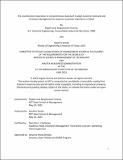The Coordination Imperative: A Comprehensive Approach to Align Customer Demand and Inventory Management for Superior Customer Experience in Retail
Author(s)
Kondo, Koichiro; Vicente, Ângelo José Bergamaschi
DownloadThesis PDF (2.137Mb)
Advisor
Chatterjee, Sharmila C.
Terms of use
Metadata
Show full item recordAbstract
The rapid growth of customers traversing different channels during their buying journey presents both opportunities and challenges for organizations. Fragmented decision-making and siloed communication between marketing and supply chain teams can lead to inefficiencies and negatively impact customer experience. This thesis proposes a conceptual framework to align customer demand and inventory management. The framework is examined in the empirical context of the fashion industry, focusing on the US market and insights from Brazil and Japan. By introducing a PDCA (Plan Do Check Action) process and cross-functional metrics, such as NPS (Net Promoter Score) and OTIF (On time in Full), this study seeks to encourage cooperation between departments and coalesce decision-making around enhancing customer experience. The research will explore the quantitative and qualitative aspects of the retail industry focusing on fashion and identify opportunities to leverage technology, marketing, and supply chain management for improved performance. Our study validated the existence of siloed operations and the drawbacks caused by silos in today’s business. Through 16 expert interviews, we identify three key factors that contribute to silos between marketing and supply chain. They are technology fragmentation, lack of integrated KPIs, and complexity of multiple channels. Further, the interviews helped uncover how the experts tackled these challenges in daily operations.
The expected deliverable is a framework that combines analyzed customer journeys with cross-functional metrics to support decision-makers in day-to-day operations. The goal is to deliver a world-class customer experience by aligning decisions to coordinate actions. There is potential to incorporate machine learning to suggest experiments and further optimize value delivery for 4 customers by retailers through multiple channels. Our conceptual framework applies to various businesses struggling with coordination between demand generation and fulfillment.
Date issued
2023-06Department
Sloan School of ManagementPublisher
Massachusetts Institute of Technology